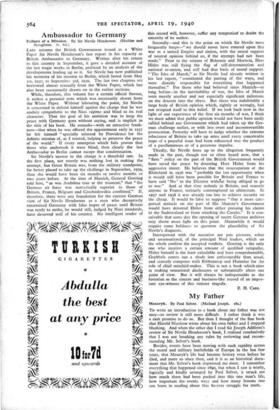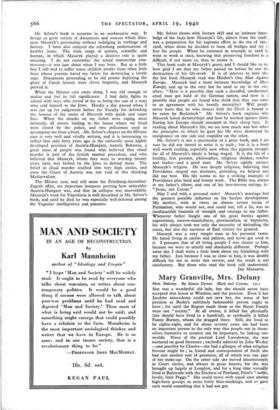My Father
Masaryk. By Paul Selver. (Michael Joseph. as.) To write an introduction to a book about my father was not easy—to review it still more difficult. I rather think it was a rash promise to do so. But then I thought of the fine book that Harold Nicolson wrote about his own father and I stopped bhIshing. And when the other day I read Sir. Joseph Addison's review of Sir Nevile Henderson's book, I realised conclusivily that I was not breaking any rules by 'reviewing and recom- mending Mr. Selver's book.
Besides, events have been moving with such rapidity across the moral and military battlefields of Europe in the last few years, that Masaryk's life had become history even before he died, and more so since then, and it is as an historical docu- ment that Mr. Selver's book impressed me most. I remember everything that happened since 1890, but when I saw it neatly, logically and kindly arranged by Paul Selver, it struck me how much there had been packed into this ' One man's life, how important the events were and how many lessons dne can learn in reading about this 8o-year struggle for truth.- Mr. Selver's book is accurate in an unobtrusive way. It brings us great variety of documents and sources which illus- trate Masaryk's personality without indulging in verbiage and flattery. I have also enjoyed the refreshing undercurrent of healthy irony. The wide range of actions, scientific and human, in which Masaryk played a decisive role is quite amazing. I do not remember the actual manuscript con- troversy—it was just about when I was born. But as a little boy I still had to suffer many childish insults from other little boys whose parents hated my father for destroying a lovely saga. Documents pretending to be old poems depicting the glory of Czech history were clever forgeries, and Masaryk proved it.
When the Hilsner case came along, I was old enough to realise and feel its full significance. I had daily fights in school with boys who jeered at me as being the son of a man who sold himselt to the Jews. Hardly a day passed when I was not up for judgement before the Faculty for defending the honour of the name of Masaryk with quick and eager fists. When the attacks on my father were raging most intensely, all streets leading to the house where we lived were closed by the police, and two policemen used to accompany me from school. Mr. Selver's chapter on the Hilsner case is very well and vividly written, and it is interesting to reflect that only forty years ago in the culturally most highly developed province of Austria-Hungary, namely Bohemia, a great mass of people was found who believed that ritual murder is part of the Jewish normal procedure, and who believed that Masaryk, whom they were to worship twenty years later, was bribed by the Jews to defend them. The belief in ritual murder reached into very high circles, and even the Court of Austria was not void of this shocking Mediaevalism.
The Hilsner case, and still more the Friedjung-Aerenthal- Zagreb affair, are important instances proving how unhealthy Austria-Hungary was, and that its collapse was unavoidable. Masaryk's work for Yugoslavia is well described in Mr. Selver's book, and until he died he was especially well-beloved among the Yugoslav intelligentsia and peasants.
Mr. Selver shows with literary skill and an intimate know ledge of the facts how Masaryk's life, almost from the cracli was a preparation for his supreme effort in the era of 191..t- 1918, when alone he decided to bum all bridges and try t free his people. When he returned in triumph in 1918 h. went to work at once, knowing that preserving freedom is as difficult, if not more so, than to create it.
This book ends at Masaryk's grave, and I should like to sa
how glad I am that my father passed on before he saw the destruction of his life-work. It is of interest to note that the last book Masaryk read was Heiden's One Man Against Europe. Masaryk had a most intimate knowledge of Mei), Kampf, and up to the very last he used to say to me ver. . often: "How is it possible that such a dreadful, uneducated. cruel man got hold of the German nation, and how is it possible that people are found who think that they can come to an agreement with his beastly mentality? Will people never learn that he who dances with the Devil is bound to be eaten by Beelzebub." Mr. Selver's book explains why Masaryk hated dictatorships and how he worked against them, fearing lest Europe should succumb to their cheap lure. In reading about Masaryk's life, we see how much was lost when the principles to which he gave his life were destroyed by malignance on one side and stupidity on the other.
Mr. Selver's is not a spectacular or a great book, and I am sure he did not intend to write it as such ; but it is a book well worth reading, especially now when this gigantic struggle for all of Masaryk's ideals is being waged. It is the life of a healthy, free peasant, philosopher, religious thinker, teacher and leader—and a good man. Mr. Selver rightly stresses Masaryk's religion. He was deeply religious, believing that Providence shaped our destinies, providing we helped and did our best. His life seems to me a striking example of Providence plus hard and honest work. The Bible was always at my father's elbow, and one of his best-known sayings is : " Jesus, not Caesar."
May I end with a personal note? Masaryk's marriage had
the greatest possible influence on his further development. My mother, with at times an almost severe strain of Puritanism, who would not, and could not, tell a lie, was an inexhaustible fountain of strength and courage to my father. Whenever father fought one of his great battles against superstition, narrow-mindedness, provincialism or hypocrisy, his wife always took not only the necessity of defending the cause, but also the sureness of final victory for granted.
Masaryk was a very simple man in his personal tastes.
He hated living in castles and palaces, and never got used to it. I presume that of all living people I was closest to him, because we were so utterly and absolutely different. Perhaps some day I shall write a little book about my friendship with my father. Just because I was so close to him, it was doubly difficult for me to write this review, and the result is not satisfactory. But those who read the book will understand.
JAN MASARYK.











































 Previous page
Previous page